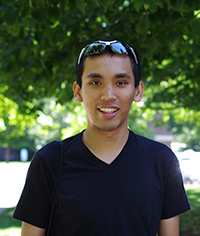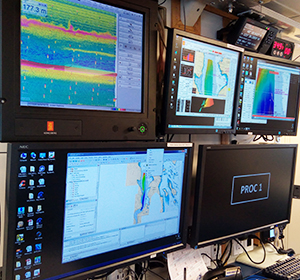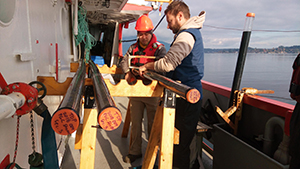Sub Navigation
Student Research: Understanding Climate Change in the North Pacific Ocean
Anson Cheung, a second-year PhD student in Earth, Environmental and Planetary Sciences, studies climate history to determine ways to best adapt to future climate change. He is a Brown University Presidential Fellow.
 The surface temperature variability of the North Pacific Ocean has received greater attention in recent years, as scientists have connected these changes to global and regional climate variations and extremes. Some significant examples include droughts in the Southwest U.S. and changes in the marine ecosystems in the Northeastern Pacific.
The surface temperature variability of the North Pacific Ocean has received greater attention in recent years, as scientists have connected these changes to global and regional climate variations and extremes. Some significant examples include droughts in the Southwest U.S. and changes in the marine ecosystems in the Northeastern Pacific.
Cheung’s research tracks these temperature differences by studying organic molecules in sediment cores from the Saanich Inlet, in British Columbia, Canada. These molecules (alkenones) act as natural recorders and document how the North Pacific Ocean’s surface temperature has changed over the past 2000 years.
 “It is important to understand how sea surface temperature of the North Pacific Ocean varies naturally and responds to human induced climate change so that we can better respond to climate changes driven by the Pacific Ocean in the future,” says Cheung.
“It is important to understand how sea surface temperature of the North Pacific Ocean varies naturally and responds to human induced climate change so that we can better respond to climate changes driven by the Pacific Ocean in the future,” says Cheung.
Cheung stresses that knowing how the climate will change over the next 10-20 years (for example, whether it will be wetter or drier or if there is a higher risk of floods), would allow decisions on how to adapt in order to minimize climate-related effects.
“Having grown up next to the Pacific Ocean, which is the largest ocean basin in the world, where different phenomena that affect our daily lives originate (e.g. El Nino Southern Oscillation), I'm always surprised by how much we still don't understand about this ocean. This motivates me to learn more about climate variability,” says Cheung.
 When thinking about his future, Cheung hopes to take what he learned at Brown and apply it to other scientific questions related to climate variability and change.
When thinking about his future, Cheung hopes to take what he learned at Brown and apply it to other scientific questions related to climate variability and change.
“I hope to use the knowledge I learned to educate the next generation on how the earth system works and how humans are significantly altering the system,” says Cheung.
Cheung grew up in Hong Kong and completed his undergraduate degree in Geosciences at the University of Arizona.